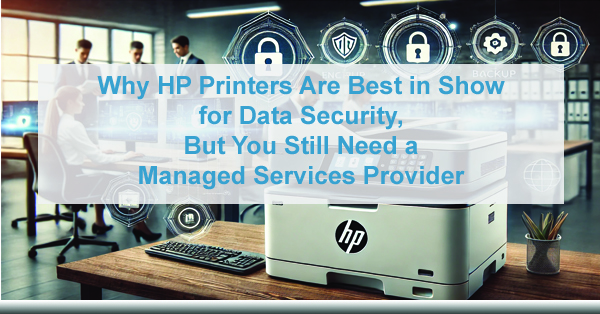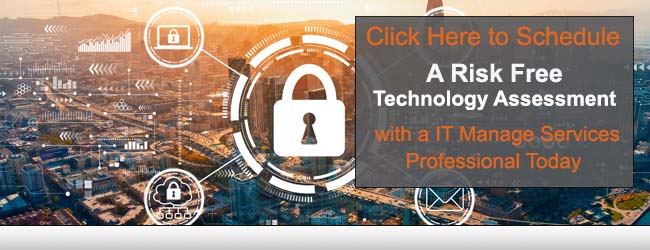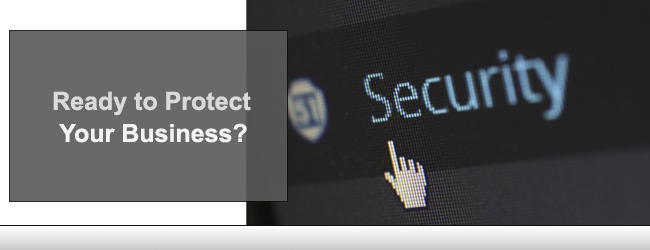
How to Manage Data Security in a High Intrusion Environment
There’s no question that to safely do business today, managing data security is paramount. As your business evolves and becomes more interconnected, your need for robust cybersecurity measures has never been more critical. Among the various devices and technologies that companies like yours rely on, printers often get overlooked despite being integral to daily operations.
HP printers, however, have distinguished themselves in the space of data security, offering advanced features to protect sensitive information. Here we’ll explore why HP printers are leading manufacturers in data security and why partnering with a Managed Services Provider (MSP) (Note: at ABT we call it Managed IT Services…potato/potato) is essential for comprehensive data protection and compliance.

HP’s Commitment to Data Security: Advances Since 2020
HP has long been a leader in the printing industry, known for its innovation and quality. They’ve always led the pack in managing data security. Specifically, since 2020, HP has made significant strides in enhancing the security features of its printers, ensuring they can (and more importantly, you can) withstand the evolving threats in the cybersecurity landscape. Here are some key advancements:
HP Sure Start Technology
HP Sure Start is a revolutionary technology that ensures the printer’s BIOS is secure. The BIOS is the fundamental software that starts the printer and checks for any threats. If the BIOS is compromised, HP Sure Start automatically detects the anomaly and initiates a self-healing process to restore the BIOS to a safe state.
Run-Time Intrusion Detection
This feature actively monitors the printer’s memory for any unusual or malicious activity. If an intrusion is detected, the printer automatically reboots to thwart the attack and sends an alert to the IT department, ensuring immediate attention to potential threats.
Whitelisting
HP printers use whitelisting to ensure that only known, secure firmware can be loaded and executed on the device. This prevents unauthorized or malicious code from compromising the printer’s operations.
Secure Boot
Secure Boot is another critical feature that ensures the integrity of the firmware before it loads. It checks the digital signature of the firmware, and if any discrepancy is found, the printer halts the boot process to prevent any potential security breach.
Encrypted Data Transmission
HP printers use advanced encryption protocols to protect data transmitted between the printer and other devices. This ensures that sensitive information, such as print jobs containing confidential documents, cannot be intercepted and compromised during transmission.

The Essential Role of a Managed Services Provider (MSP)
While HP printers offer robust security features, the reality is that data security requires a comprehensive, multi-layered approach. The leaks and intrusions aren’t always or only from your printing devices. Cyber threats are continuously evolving, and businesses must be vigilant to protect all aspects of their IT infrastructure. This is where a Managed Services Provider (MSP) in Colorado (although ABT’s team can step in anywhere) comes into play.
An MSP offers a wide range of services that extend beyond the capabilities of individual devices, ensuring comprehensive security and compliance. While we list a few here, the truth is that the Managed IT Teams are a pretty creative group. It’s their job to think about how they can best support your business most effectively.
Cybersecurity: Addressing the Gaps
Hackers are constantly finding new ways to exploit vulnerabilities within business networks. Despite the advanced security features of HP printers, gaps can still exist in other areas of a business’s IT infrastructure. Here’s how an MSP can address these gaps:
Ransomware Protection
Ransomware attacks have become increasingly sophisticated, targeting businesses of all sizes. An MSP can implement advanced threat detection and response solutions to identify and mitigate ransomware threats before they cause significant damage. This includes continuous monitoring, regular updates to security protocols, and employee training to recognize phishing attempts and other common attack vectors.
Endpoint Security
Printers are just one endpoint in a business’s network. Laptops, desktops, mobile devices, and other networked devices also require robust security measures. An MSP can provide comprehensive endpoint security solutions, ensuring that all devices connected to the network are protected against potential threats.
Backup and Disaster Recovery
Data loss can occur due to cyberattacks, hardware failures, or natural disasters. An MSP can implement reliable backup and disaster recovery solutions to ensure that business-critical data is regularly backed up and can be quickly restored in the event of a loss. This minimizes downtime and ensures business continuity.
Compliance and Regulatory Standards
Different industries have varying compliance requirements regarding data security and privacy. An MSP stays abreast of the latest regulatory changes and helps businesses implement the necessary measures to comply with standards such as GDPR, HIPAA, and CCPA. This not only protects sensitive data but also avoids costly fines and legal repercussions.
The Small Business Value of a Virtual Chief Information Officer (vCIO)
Small businesses often lack the resources to hire a full-time Chief Information Officer (CIO), yet they still need strategic IT guidance to navigate the complexities of data security and compliance. This is where a Virtual Chief Information Officer (vCIO) comes in. A vCIO provides the expertise and strategic oversight of a traditional CIO but on a flexible, as-needed basis.
Benefits of a vCIO for Small Businesses:
Strategic Planning
A vCIO helps small businesses develop and implement long-term IT strategies aligned with their business goals. This includes planning for future growth, technology upgrades, and security enhancements.
Cost-Effective Expertise
Hiring a full-time CIO can be prohibitively expensive for small businesses. A vCIO provides access to high-level expertise without the significant financial commitment, making it a cost-effective solution.
Enhanced Security Posture
With a vCIO, small businesses can benefit from proactive security measures, regular risk assessments, and strategic recommendations to strengthen their overall security posture.
Compliance Management
A vCIO ensures that small businesses stay compliant with industry regulations, reducing the risk of fines and enhancing customer trust.
Related Articles:
Your 2024 Guide to the Best HP Printers
How HP Cloud Services Propel CO SMBs Forward
Cybersecurity and vCIO Services | Scaling Business in 2024
HP printers have set a high standard for data security with their advanced features and continuous innovations. However, true data security requires a holistic approach that encompasses all aspects of a business’s IT infrastructure. Partnering with a Managed Services Provider (MSP) ensures comprehensive protection against evolving cyber threats and helps your business meet compliance standards.
For your small to medium business, leveraging the expertise of a Virtual Chief Information Officer (vCIO) will provides strategic guidance and cost-effective solutions to navigate the complexities of data security and IT management.
Investing in HP printers is an obvious crucial step towards securing your business’s data, but it is just one piece of the puzzle. By working with an MSP, you can ensure that your entire IT environment is fortified, compliant, and prepared to face the challenges of today’s digital world.
